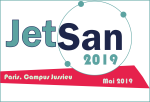Conference thematics1) Intelligent systems for autonomy The main concerns of intelligent systems (medical devices, compensation assistance or rehabilitation systems, monitoring systems for the well-being of people, etc.) for the autonomy of elderly, fragile or disabled people are the detection of inconsistencies in behaviour, the adaptation of the system to the environmental context and characteristics of the person, the determination of profiles, the proposal of preventive health strategies, monitoring for rehabilitation, ageing well, etc. Artificial Intelligence (AI) provides promising learning, recognition and decision-making tools for this new generation of intelligent systems for autonomy. For example, Deep Learning tools make it possible to learn a person's life habits at home in order to deduce inconsistencies that can potentially reveal the appearance of a health-related anomaly (activity limitation, fall, etc.). However, the design and evaluation of these intelligent systems raises the question of the protection of health and usage data collected and used. Keywords: Intelligent systems for autonomy, Elderly people, People with disabilities, Artificial intelligence, Machine Learning, Deep Learning, Data protection, Design, Use.
2) Biomedical devices, E-Health and Biomedical Imagery The main concerns in the field of biomedical devices are simulation and design technologies, miniaturization, sensitivity and accuracy of measurement under ex and in vivo conditions. For devices implanted in the human body, biocompatibility, remote feeding and low energy consumption are other important parameters to consider. However, for better management of public health costs (reduction of hospitalization time, development of ambulatory or home care solutions), there is also interest in connected biomedical devices. This involves the integration into the biomedical device of radio communication modules with wireless power supply, and allowing direct or indirect connection to the Internet network for telemedicine. In addition, the ageing of the population and the increase in multi-pathological patients will require the use of multiple connected sensors, combined with problems of low consumption and autonomy.
Tele-expertise and tele-regulation are increasingly being used to solve the problems of medical desertification. This concerns sites that no longer have the specialist to interpret and which, through tele-expertise, benefit from the skills of an imaging expertise centre.
Another aspect of this theme is biomedical imaging, which will make it possible, via algorithms, to detect pathologies or guide the surgeon's action during a surgical operation.
Keywords: implanted biomedical device, sensor network on or in the human body (BASN), connected sensors, low consumption, telemedicine, medical data security, ethics, Image sensors, image processing, robotics and biomedical imaging, remote operation, health data transmission, shared medical records, embedded systems.. |


